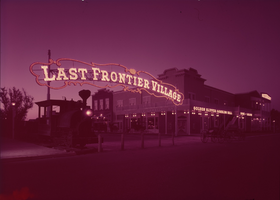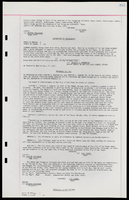Search the Special Collections and Archives Portal
Search Results

Transcript of interview with Amber Allan by David Schwartz, December 21, 2016
Date
Archival Collection
Description
Amber Allan grew up in West Virginia and moved to Las Vegas at the age of 16. She entered the gaming industry in 2000 as a change person at Arizona Charlie’s Boulder where she later held the positions of floorperson and assistant shift manager. Allan would eventually move to Santa Fe Station in 2005 as relief shift manager, later to the Texas Station as a shift manager, and then to Palace Station in 2008 into the slot operations and technical manager role. She then returned to Texas Station at the end of 2008 as director of slot operations and then moved to Aliante Station into the same role in 2009. Allan started at Konami Gaming, Inc. in 2012 where she has worked as an analyst, product specialist, and, currently, as technical sales executive. The interview with Allan begins with her discussion of moving to Las Vegas and the experiences and roles she held as she started in the gaming industry. She discusses the various responsibilities she had in those roles, the types of skills required for them, and the kinds of disputes that are handled in certain supervisory positions. Allan also mentions and discusses the topic of hold percentage as it relates to slot and video poker players. She later describes her philosophy on what makes a good slot floor and also what customers are looking for in slots. Allan then provides the details of her move to the manufacturing side of the slot industry, and she gives her thoughts on what makes both a good and bad slot manager. The interview then shifts to the discussion of free slot play; ticket-in, ticket-out; changes in slot management; and the future of slot machines. The interview concludes with Allan’s discussion of her personal gambling as well as her advice for young people who want to go into the slot industry.
Text

Transcript of interview with Tony Grasso by Coleen Seifert, February 29 & March 1, 1980
Date
Archival Collection
Description
On February 29, 1980, Coleen Seifert interviewed Tony Grasso (born 1926 in Brooklyn, New York) about his career in gaming. Grasso first provides details on his background and how he ended up moving to Las Vegas in 1951 before talking about his experience as a dealer in some of the early casinos. He also talks a little about the different roles and games that casino workers deal and how players are invited to visit casinos. The interview concludes with a discussion on gaming unions and Grasso’s future plans. On a date that soon followed the above date, Seifert also interviewed Doug Charles (born 1954 in Brooklyn, New York) about his career in the gaming industry. Charles also talks about his family background, his arrival to Las Vegas in 1957, and the early development of the various gaming properties in Las Vegas. He later goes into detail over some of his experiences as a dealer, his opinions on mob control over gaming, and some of the political and legal issues that have arisen in La
Text
Earl McDonald oral history interview
Identifier
Abstract
Oral history interview with Earl McDonald conducted by Claytee D. White on October 4, 2000 for the UNLV University Libraries Oral History Collection. In this interview, McDonald, a sixty-year resident of Las Vegas, Nevada, relates his background in Mississippi and Louisiana, leaving home at fourteen and traveling to California, and being drafted into the Army during World War II. He then discusses moving to Las Vegas and working as a musician and valet while training to be an electrician. He talks at length about the Westside, detailing the clubs and restaurants that opened along Jackson Street, including the El Rio, the Cotton Club, the El Morocco, and the Ebony Club. He also explains the discrimination that prevented Black individuals from joining unions even when they worked union jobs, and the response by the United States Justice department. He also discusses gambling and the potential for revitalizing the Westside community.
Archival Collection
Dr. Wilbur Sylvester oral history interview
Identifier
Abstract
Oral history interview with Dr. Wilbur Sylvester conducted by Elizabeth Polson on April 06, 1976 for the Ralph Roske Oral History Project on Early Las Vegas. In this interview, Sylvester discusses his personal history and the history of Las Vegas, Nevada. Sylvester describes arriving in Las Vegas during the 1940s, life during that time, and prominent figures in the city, such as Maude Frazier. Sylvester continues to discuss important people in Nevada's history, like Key Pittman and other politicians. He goes on to talk about gambling in Las Vegas, tuberculosis patients who sought out drier climates to alleviate their condition, and his career as a podiatrist.
Archival Collection
Conference materials, 1994, 2000-2015
Level of Description
Scope and Contents
The conference materials include resources and research collected by Dr. Spilde during conferences (1994, 2000-2015). Materials include annual reports, newsletters, biographies, presentations, informational packets, directories, notes, invitations, attendee rosters, conference papers, memos, correspondence, event guides, pamphlets, video and audio recordings of conferences, and newspaper articles from the 5th Annual Alberta Gaming Institute, 12th Annual Indian Gaming Conference, First International Symposium on Economic and Social Impacts of Gambling, International Conference on Gambling and Risk Taking, Global Gaming Expo (G2E), iGaming of North America and Asia, Saratoga Institute on Equine, Racing, and Gaming Law, and 20 Years of IGRA.
Archival Collection
Collection Name: Katherine A. Spilde Papers on Native American Gaming
Box/Folder: N/A
Archival Component

Film transparency of the entrance to the Last Frontier Village at dusk (Las Vegas), circa 1950s
Date
Archival Collection
Description
Night view of the front entrance to the Last Frontier Village. The Golden Slipper Gambling Hall is seen in the foreground. The gambling hall was named the Golden Slipper prior to its being named the Silver Slipper.
Site Name: Frontier
Address: 3120 Las Vegas Boulevard South
Image



